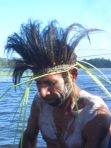 Papua New Guinea's parliament amended sections of the Environment and Conservation Act 2000, which rules on major resource projects in the country. The amendments give the director of the Office of Environment and Conservation wide power to authorize environmental plans submitted by investors. The authority granted is so broad that the director's final decision "may not be challenged or reviewed in any court or tribunal, except at the instigation of an Authorization Instrument".
Papua New Guinea's parliament amended sections of the Environment and Conservation Act 2000, which rules on major resource projects in the country. The amendments give the director of the Office of Environment and Conservation wide power to authorize environmental plans submitted by investors. The authority granted is so broad that the director's final decision "may not be challenged or reviewed in any court or tribunal, except at the instigation of an Authorization Instrument".
According to IRIN, , the amendment has wide range implications for some six million people's rights to land and environment protection. For many years Papua New Guineans could individually or under customary rights protect their land sueing or claiming compensation in case of environmental damage. Now, with the amendments, they have lost such rights.
Papua New Guinean indigenous groups have long struggled for their land and environmental rights. Between 1997 and 1999, people were killed when confronting the mining activities of Freeport-Rio Tinto in Bougainville and Ok Tedi copper mines. According to IRIN, more than 5,000 people then lost their lives.
Also logging operations have destroyed or degraded forests with harmful impacts on forest dwellers. And more recently, another pressure has been added on forests and forest people: large scale oil palm plantations promoted by World Bank loans, that have increased in a country where 97% of the land is communally owned and most of its 5 million population still lives in the rural area and rely on subsistence farming for their livelihoods.
A massive wave of deforestation could increase poverty due to destruction of livelihoods, land concentration and displacement, loss of food sovereignty for local communities, while producing carbon emissions from both deforestation and industrial agrobusiness. It is estimated that roughly 1,000 investment groups have targeted more than 50 countries in Asia, Oceania, Africa and Latin America.


